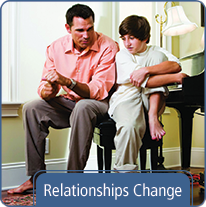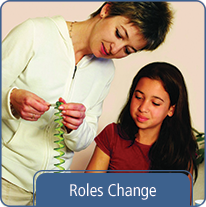Changes & Coping
The changes that take place in the brain of someone with FTD are just the tip of the iceberg! There’s a domino effect that cascades down into the lives of the entire family and beyond. Yes, change is hard, but with guidance and support you can learn, adjust and move effectively through difficult experiences.
The dynamics of a family (how you and your family interact with one another) will change dramatically when a parent has FTD. Follow the links at the bottom of this page for more information on how relationships change as well as information on how roles and responsibilities change in a family.
Facing FTD as a family
It is normal to feel frustrated and confused about the changes happening all around you. You cannot control that your parent has FTD, and you cannot control the type of symptoms he/she will have or how fast they progress. But there are ways to help manage the changes, things you can do to help the person with FTD and ways to help the rest of your family.
Facing FTD as a family can bring your family closer together. Working together as a team will help ensure everyone – the parent who is ill, the parent who is well, the children in the house and even your pets – gets what they need. Keep in mind that even the best problem solvers find that life won’t be perfect and even the brightest ideas don’t work all the time.
The keys to coping
When you feel sad and lonely you may tell yourself that no one likes you. That can lead to spending more time alone, which adds to a feeling of isolation. The key to coping with the stress of your parent’s illness lies in recognizing that your thoughts and feelings influence your actions. Taking steps to tune into and adjust each of these can help you to manage the difficult times.
Below you’ll find a list of tools that can help make FTD easier to deal with. Not every suggestion will work for every person, but take some time to find the ones that relate to your experience and try integrating some of these coping skills into your life.
Set priorities. Day-to-day challenges can be tough. Don’t lose sight of the values and goals that are most important to you.
- Do things that make you happy or proud. It is important to stay in touch with your strengths in the midst of difficult times.
- Stay focused on your schoolwork, sports and activities.
- Stay in touch with your friends, especially the ones you feel comfortable talking to, and those who make you feel good about yourself.
- Take care of yourself – try to get enough sleep, eat right, ask your well parent to take you to a doctor if you feel sick.
- Remember, positive thoughts can change your life. Positive thinking and surrounding yourself with positive people will help give you the strength you will need to get through this difficult experience and help your family.
Change your approach. It can be difficult to accept that your loved one has FTD. As you do it becomes easier to adjust your expectations and your approach to him or her.
- Go slowly when you are showing or telling something to the person with FTD. They need more time to understand than they used to.
- Repeat things if they need you to.
- Say it again but differently. If they don’t understand something you are saying, remember that repeating the same phrase or words may not help.Think of a different way to say the same thing.
- Accept their limitations. You wouldn’t expect a person who is paralyzed to go rock climbing. So don’t expect a person with FTD to understand something complicated or make sense all the time.
- Try a mantra. Something you repeat to yourself over and over, can help you get through difficult or embarrassing situations. Try a mantra like “She can’t help it,” or “No harm done.” You may have to remind yourself often that your loved one isn’t intentionally being difficult; they are sick with a terrible illness that has brought on all these changes.
- Remind yourself often that the person with FTD loves you, even though they may not be able to show it anymore.
- Show them often that you love them, even though when you do they may not react positively to it or at all.
- Stay as positive as you can. Find things to be thankful for and ways to enjoy life. Take it one day at a time.
- Forgive yourself when you have been impatient or angry with them, and don’t feel guilty about those feelings. You are only human. Getting angry does not mean you love them any less.
Choose positive activities. What you do, your actions and activities, can help you to cope with difficult emotional situations. It can help you feel more in control when you develop new ways to relate to the person with FTD and to help out at home.
- Be cooperative and willing to help out around the house.
- Do the chores before anyone has to ask you and do extra chores, even if it’s not your turn.
- Identify the “normal” things you and your loved one used to do together. Take a walk; watch a favorite show or movie; listen to music; go through old photo albums; work on household chores together.
- Pick some special activities to do with your family and talk with your mom or dad about how to build them into your family’s schedule.
- Discover new “favorites,” like a new favorite restaurant if the one you used to love is too noisy.
- Play games together but ease up on the rules if the person has trouble understanding how to play.
- Carry “Awareness Cards” from AFTD that ask for understanding if the person’s behavior in public is odd or embarrassing. Hand the waitress or store clerk the card to explain that your loved one has a brain disease.
- Use your power to make a difference. Get involved to spread the word about FTD or raise money for FTD research.
Share your feelings…Really
This is so important to dealing with the changes you are experiencing that there is a whole page devoted to it. For more on feelings, see Sometimes I Feel.
Go to Teens Like Me where you can learn more about how other teens have handled the changes they see happening and the feelings they have about those changes. Don’t forget: You are not in this alone.
 |
 |



